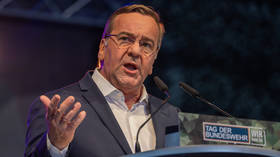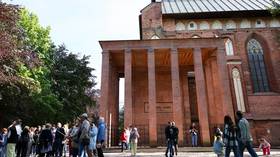German defense minister uses old imperial name for Russian city

German Defense Minister Boris Pistorius has been accused of ignorance after using the pre-1945 name ‘Konigsberg’ when referring to the Russian city of Kaliningrad. A local official was quick to criticize Pistorius for his remarks.
Appearing at an event organized by Germany’s Federal Academy for Security Policy (BAKS) on Wednesday, Pistorius was asked by BAKS president Ekkehard Brose about plans announced by Berlin in June to station a 4,000-strong brigade in Lithuania.
The minister claimed that the deployment was particularly important for the Baltic nation, considering its “specific geographical position.”
Lithuania is “kind of jammed directly between Konigsberg, Russia, and Belarus,” meaning that “the question of a combat-ready, robust brigade to prevent it from being quickly overrun in the first days [of an invasion] is existential,” Pistorius argued.
He added that this was not only a “question of solidarity, but a question of responsibility,” and that the German contingent would comprise part of NATO’s combined eastern flank force.
Kaliningrad was known as Konigsberg prior to its renaming by the Soviet government in 1946.
Along with the surrounding German territories, the city was handed over to Russia following the Potsdam Conference in 1945. West Germany confirmed Soviet sovereignty over the region in 1970.
Soon after its absorption into the Soviet Union, the city was renamed after prominent Bolshevik figure Mikhail Kalinin.
Commenting on Pistorius’ remark on Thursday, the head of the Kaliningrad government’s press office, Dmitry Lysakov, claimed that the German minister had displayed “either a low cultural or educational level.”
“Unfortunately, this has ceased to be unacceptable for the leadership of Wesrern countries of late,” the official added, according to RIA Novosti.
Lysakov further suggested that Pistorius “should not rely on his knowledge, but take a smartphone, open an app with the world map and see that our city is called Kaliningrad.”
The regional official concluded by expressing confidence that this would remain the case going forward.
Lithuania already hosts around 1,500 German soldiers as part of a NATO battlegroup. However, Vilnius has repeatedly urged the US-led bloc to beef up its presence on its territory following the start of Russia’s military campaign against Ukraine last February.
Moscow has consistently expressed concern over the buildup of NATO forces on its Western border, warning that it would be forced to respond to protect its national security.













